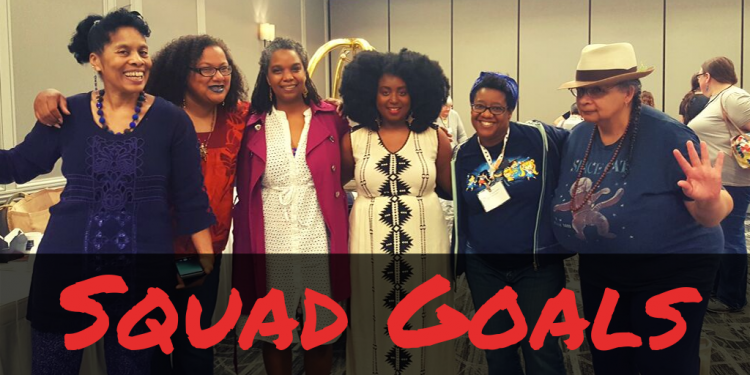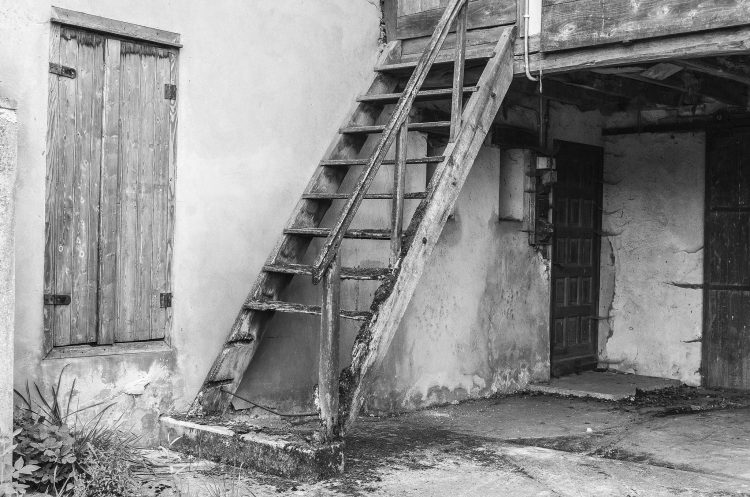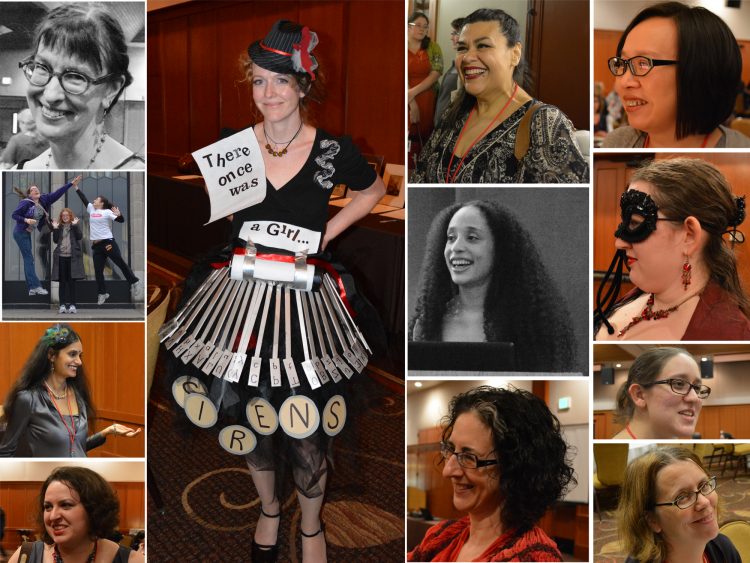Before WisCon I was having a conversation with a person who used to come to the con but does not, anymore. I asked why and they said, “WisCon isn’t fun, anymore,” and I thought about that for a while.
This person is not the only person to have expressed such a sentiment to me before that moment. I’ve heard from others over the years, usually people who have stopped coming since MoonFail but a few are people who stopped coming in the last couple of years during the major shakeup that started with FrenkelFail and that the con is still emerging from.
- WisCon isn’t that fun.
- I’m not comfortable there.
- I feel unwelcome.
- I don’t like the vibe, anymore.
I’ve listened to these people and, in some cases, internalized these complaints and thought about whether or not there is something that needs to be done.
That’s what happened right before the con got started. I internalized that person’s issues.
And then the POC Dinner happened.
Okay, I say happened like Woop, it appeared! No. I organized it this year, as I have done in many previous years, and several wonderful and amazing volunteers helped me out at con.
The room was packed. I think we had 80 people all told. It was loud. There was so much joyous conversation and laughter. It was a room full of People of Color and Native folk having a good time and I loved it.
Loved it even though I stress myself out a bit every year trying to pull it together. Because each year since it went from being an informal lunch to a coordinated dinner in 2009, more and more and more POC have come to the con. We’ve had to switch locations and food plans and even how we collect the money many times to accommodate all the people who come. I can’t really complain about that.
Because there is this beautiful space, this wonderful moment, right before the con gets underway where we can all be together and see each other and know that the people in the room have our backs at the con.
Every year someone or two someones or half a dozen someones comes up to me to say:
- Thank you.
- This was amazing.
- I’ve never experienced anything like this at an SF convention before.
- I never felt so welcomed and like I belong.
- When I first heard about this I thought it was gonna be 20 people but it was so many!
- I didn’t think a con could be like this for a person like me.
- This meant the world to me.
Almost as long as we’ve been having a POC Dinner, we’ve had the POC Safer Space at the con. It’s a place where POC and Native people can go to just be around each other and have discussions about our own stuff. A place where we acknowledge that we come from many different backgrounds, even as we all huddle under this one umbrella, and that it’s important to be able to talk and have community and decompress away from the white gaze. That doesn’t mean we’re all only ever going to be in that room—we came to WisCon, after all, and want to participate in all of it. It does mean that there are still people at the con giving us reason to want to talk amongst ourselves.
Every year I hear from people:
- Thank you for that space.
- Thank you for fighting for that space.
- It was important for me to be able to process what happened on that panel.
- It was crucial that I have somewhere to go besides my room so I could be calm and safe but not alone.
When I first started coming to WisCon in 2003 there were a handful of non-white people in attendance. I don’t think I counted that year. I did the next year. Still a handful. Other folks remember when it was a literal handful—five people out of 800-1000.
This is still the case at a lot of other SF cons right now. Small, midsized, local, regional, large, allegedly global…
People who go to them can often count the POC because they stand out. They recognize (or think they recognize) those people the next time and the time after because they are so few. That was WisCon. Until we changed it.
I think it started in earnest around 2009 after that horrendous winter of RaceFail and a bunch of white folks showing their asses on the Internet. Some of those white folks were WisCon regulars. And some of us were determined they weren’t going to chase us away.
The first time I came to WisCon I knew I wanted to come every year, again and again, for the rest of my life. Yes, there were few brown people. I was used to that. Yes, there were incidents around me and my brown-ness. I was used to that. It was much less terrible than WorldCon. And the wonderful experiences far, far outweighed the unpleasant ones. The panels were amazing, the speeches were amazing, the people I met were amazing.
I wasn’t gonna give that up over Faily McFailerson and her cronies.
I wasn’t the only one to feel that way.
More people of color started to come because they wanted to meet this one person, because they had a friend going, because high profile brown folks told other brown folks to come and see how a con could be.
They came and saw that WisCon wasn’t a perfect con but that it had potential. That there were some panels about POC-specific issues. That there was a group of us who tried to make it our business to be welcoming. And when those moments of the con going south happened, some of us made it our business to fight to make change to that WisCon could be a better space for everyone. Everyone.
I say again: Everyone.
Unless.
Unless you’re a person who makes a space worse for certain people. People you know you can step on because they’re stepped on everywhere. People who are marginalized even in spaces that are supposed to be a refuge for marginalized people. But you know, like I know, that there are hierarchies, and intersections, and even in a feminist space some feminists are “less important” than others. Or, at least, that’s how things were for some for a long while. Until we changed it. And that right there is what’s making some people mad. And the people mad about that? Are not going to see WisCon as a better space for them.

Oh well.
Because here’s the thing: 99% of the people I have seen or heard complaining about how WisCon isn’t comfortable for them and WisCon isn’t fun are white people. Not 100%. But 99%. It’s a bunch.
You know what else I’ve noticed about the people making these complaints? A lot of them are cisgender, a lot of them are men, a lot of them are people with privilege along multiple axes. Funny that.
And while it makes me sad at any time for folks to feel excluded, or like a space has been taken away from them, I have to say:
Where were you when this was other people feeling this way?
Where were you when people who are marginalized in nearly every other fandom space and came to WisCon thinking it would be different said they felt uncomfortable, unwelcome, threatened, unsafe?
I don’t remember seeing some of your faces when the fight for the Safer Space happened. I don’t remember you chiming in when a guy on the concom was abusing members of the concom (those who weren’t his friends…) and then people at the convention. I don’t recall you having any kind of problem when volunteers were leaving left and right because they were treated horribly by the “Old Guard” runners of the con. I don’t remember you standing up to the woman the co-chairs had to ban last year because she verbally abused everyone from hotel staff to volunteers at the reg desk every single year.
I don’t even remember some of you ever saying “Hey, I’ll do some work to make WisCon run smoothly for all attendees.”
Meanwhile, the people who I and others have worked hard to make feel welcome and relatively safe and empowered to report incidents of microagression or just plain old aggression have said:
- Thank you.
- This was so important to me.
- How can I help?
- You do so much and you look exhausted, can I get you something?
- Can I be part of making this all work next time?
As N K Jemisin said in her speech at WisCon 38: “If you won’t ride or die for anyone else, how can you expect them to ride or die for you?”
I ride or die for the people who have felt uncomfortable and pushed out and marginalized historically in this community, and at this con. I ride or die for the people who have come to me, sometimes with tears in their eyes, to tell me they’ve never felt more welcome and wanted and embraced by a con before this one.
I am not unwilling to ride or die for all y’all. I’ll say it again: I want WisCon to be a better space for everyone. I want you to surf this wave of change with us. But only if you’re willing to make the con better for both you and yours as well as me and mine, she and hers, they and theirs, Jackie an’ ’em, and all the other folks who want it to be great for all of us together.
If you’re uncomfortable now, but weren’t before, then think about that. Really think about it. Consider if you were making people uncomfortable before, even without thought or intention. Consider that you’re feeling left out because, in the course of our claiming a space for ourselves, we made clear to you just how much you or people like you contributed to our pain, our lack of fun, our lack of safety. Ponder the puzzle of how a con dedicated to feminism, populated by many amazing people, somehow ended up being a place where people who weren’t the right color, the right class, the right age, the right level of ability, the right gender presentation felt like they didn’t fully belong. And delve deep into the mystery of how fixing that problem is the thing that’s made you run away.
Footnotes











